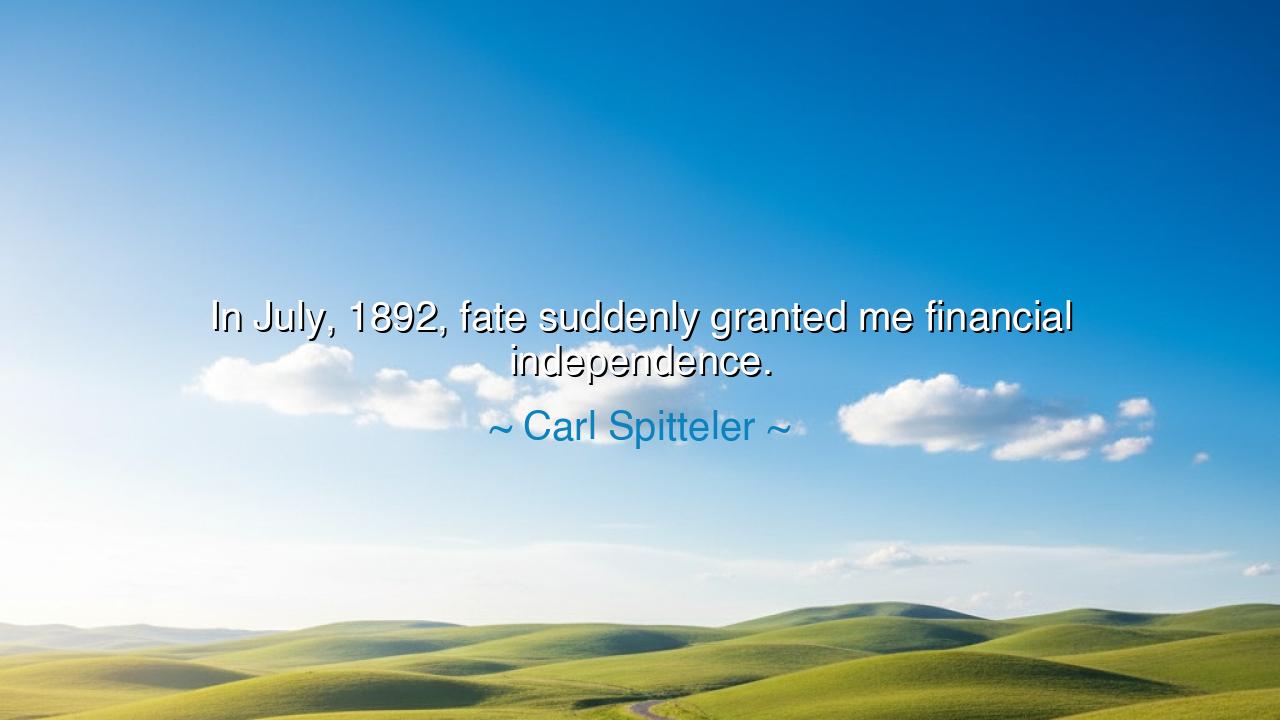
In July, 1892, fate suddenly granted me financial independence.






Hear the words of Carl Spitteler, the poet and thinker whose quiet endurance bore fruit in his later years: “In July, 1892, fate suddenly granted me financial independence.” This brief statement, though simple, carries within it a profound reflection on destiny, perseverance, and the nature of freedom. For in it, we hear the sigh of a man who had long labored under the weight of necessity, and who at last tasted the sweetness of liberation—not the reckless freedom of youth, but the hard-earned independence born of patience and endurance.
Spitteler, born in 1845 in Switzerland, was not always known to fortune. Like many artists, he spent his early life wandering through hardship and obscurity, working as a teacher, a journalist, and even a private tutor. His genius was slow to be recognized, and his dreams often struggled against the limits of circumstance. Yet he did not abandon his path. He lived frugally, devoting himself to his writing, guided by an inner faith that the day would come when fate would meet him halfway. And so, in July of 1892, when an inheritance finally freed him from the need to labor for his bread, his words were not of arrogance, but of reverent wonder—he felt granted, not triumphant. It was as if the heavens themselves had opened a door long shut.
To the ancients, such a moment would have been seen as the favor of Fortuna, the goddess of destiny. Yet the wise among them knew that fortune does not smile upon idleness, but upon perseverance. For fate, though capricious, favors those who prepare themselves to receive her gifts. Spitteler’s “sudden” freedom was no accident—it was the culmination of years of quiet toil, of faith in the value of his art when the world offered him neither comfort nor recognition. When at last financial independence arrived, it was not mere wealth he rejoiced in, but the liberation of his mind and spirit. For money, when joined with purpose, becomes not greed but freedom—the freedom to think, to create, to serve truth without compromise.
Consider also the tale of Ludwig van Beethoven, who, though deaf and often tormented by poverty, found solace when a few noble patrons granted him a lifetime stipend. It was not riches he sought, but independence—the right to compose according to his own conscience, unshackled from the demands of those who would turn his genius into a servant’s craft. In this, Beethoven and Spitteler shared the same victory: the triumph of the spirit over material bondage. For both men, independence was the soil in which creativity could finally bloom.
But Spitteler’s reflection also holds a deeper warning: that fate’s gifts come not when we demand them, but when we are ready to bear their weight. Many yearn for independence, yet few are prepared for the solitude it brings. To be free is not merely to be unbound—it is to carry one’s own burdens, to act without excuse, to live in full responsibility to one’s calling. When Spitteler received his freedom, he did not squander it in idleness; he turned it into creation. From that moment, his greatest works began to take form, culminating in Olympian Spring, the epic that would one day earn him the Nobel Prize.
Thus, his words teach us that independence—whether financial, spiritual, or intellectual—is not something fate gives to the unready. It is a gift that must be earned through discipline and faith. The suddenness of fortune is often only an illusion; the world sees the lightning, but not the slow gathering of clouds. Those who labor quietly, who cultivate their craft and hold fast to their purpose, prepare themselves for the moment when destiny calls their name.
So let this be the lesson, children of tomorrow: do not curse the long years of struggle, for they are your apprenticeship in patience. When your own “July” arrives—when fate opens her hand and grants you the freedom you have long sought—receive it not with vanity, but with gratitude. Use your independence not to flee from effort, but to deepen it. For the truest freedom is not the power to do nothing, but the power to fulfill your highest purpose without fear.
And when you stand, as Spitteler did, at the threshold of new liberty, remember this: fate grants freedom only to those who have learned how to use it. Treasure it, serve it, and let it kindle the light of creation within you. For that is the destiny of the steadfast—the reward of those who walk faithfully through the long night, until the dawn of independence breaks upon their path.






AAdministratorAdministrator
Welcome, honored guests. Please leave a comment, we will respond soon